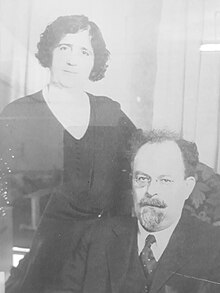Abraham Zvi Idelsohn
Abraham Zvi Idelsohn (born July 14, 1882 in Felixberg, Jūrkalne municipality, Ventspils district , Russian Empire ; died August 14, 1938 in Johannesburg ) was a Jewish music researcher and Chasan .
Life
Idelsohn was born as the son of a shochet and a chasan in a Latvian fishing village and was introduced to the chants of the synagogue and the Jewish folk songs at an early age . After training as a Chasan with Abraham Mordechai Rabinowitz in Libau and studying music in Königsberg , London , Berlin and Leipzig , he officiated as Chasan in Regensburg in 1903 and in the same position in Johannesburg, South Africa in 1905 . In 1906 he emigrated to Jerusalem , where he devoted himself as a music teacher and chasan specifically to the study of oriental music and in 1910 founded an institute for Jewish music . With the help of a grant from the Vienna Academy Idelsohn took from 1906 to 1921 songs oriental Jews in Jerusalem on records and transcribed them. These transcriptions fill five volumes of his ten-volume masterpiece, Hebrew-Oriental Melody Treasure . The first volume appeared in 1914 and was dedicated to the Yemeni Jewish tradition; the last volume appeared in 1932. During the First World War , Idelsohn was stationed in Gaza as a military bandmaster of the Ottoman Army . In 1919 he returned to Jerusalem, gave lectures in Berlin and Leipzig in the summer of 1921 and from 1922 in the USA , where in 1924 he received the first professorship for Jewish music at the Hebrew Union College in Cincinnati . Since 1930 he suffered from health problems and from 1934 was no longer able to work. In 1937 he traveled to his family in Johannesburg, where he died the following year.
The outstanding achievement of Idelsohn lies in his discovery of the oriental Jewish communities with their traditional musical culture as well as in the expansion of the general knowledge about Jewish music from the Ashkenazi to the Sephardic and Middle Eastern traditions. His more than 1000 field recordings are of inestimable value, since the conditions of cultural isolation under which they were created no longer exist today. He was one of the first ethnomusicologists which the oral traditions when eating for research purposes the same weight as the written records. In addition to his musical and liturgical studies, he also researched oriental languages and poetry as well as the Arabic maqam techniques. He made comparisons between the ancient Hebrew and the early Christian liturgy; H. both Gregorian chant and Byzantine and Jacobite songs.
Idelsohn was also active as a composer and processed a Hasidic melody into the famous folk song Hava Nagila and provided it with words.
Works
- Hebrew-Oriental Melody Treasure , 10 volumes, Berlin and Leipzig 1914–1932
- History of Jewish Music (Hebrew), 2 volumes, Jerusalem 1924–1928
- Jewish Music. Its Historical Development , New York 1929, 2nd edition 1944
- Manual of Musical Illustrations of Lectures on Jewish Music and Liturgy , Cincinnati 1926
literature
- Riemann music lexicon, personal section.
- Encyclopaedia Judaica , Volume 8, pp. 1223-1224.
- Grove Dictionary , Vol. 9, pp. 18-19.
- A. Sendrey: Bibliography of Jewish Music . New York 1951 (with complete catalog raisonné)
- Regina Randhofer: Hebrew-oriental melody treasure . In: Dan Diner (Ed.): Encyclopedia of Jewish History and Culture (EJGK). Volume 3: He-Lu. Metzler, Stuttgart / Weimar 2012, ISBN 978-3-476-02503-6 , pp. 18–24.
Web links
- Literature by and about Abraham Zvi Idelsohn in the catalog of the German National Library
- Works by and about Abraham Zvi Idelsohn in the JCS University Library Frankfurt am Main: Digital Collections Judaica
- Sound documents from the phonogram archive
- The Abraham Zvi Idelsohn Memorial Volume: Book Review
- Hermann Cohen's interpretation of Shema Yisrael (PDF file; 344 kB)
| personal data | |
|---|---|
| SURNAME | Idelsohn, Abraham Zvi |
| BRIEF DESCRIPTION | Jewish music researcher |
| DATE OF BIRTH | July 14, 1882 |
| PLACE OF BIRTH | Felixberg, Jūrkalne Municipality, Ventspils District , Russian Empire |
| DATE OF DEATH | August 14, 1938 |
| Place of death | Johannesburg |
